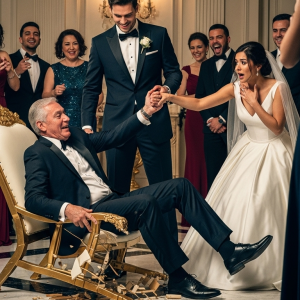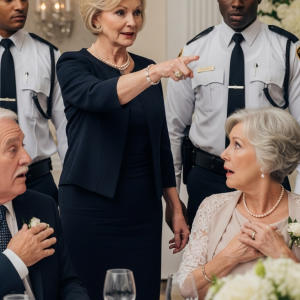The snow crunched beneath my worn boots as I walked up the driveway, clutching a small, meticulously wrapped gift. Christmas lights twinkled from the sprawling mansion, and the sound of music and laughter spilled into the cold December air.
It was a world away from my tiny room above Mrs. Peterson’s garage, where I’d spent the last eighteen months. Three years ago, before I sold our family home to fund their dreams, I would have been inside that house, one of the hosts.
“You’re making the right choice, Mom,” Emma had said, her hand on my arm as I signed the papers. David had promised me a wing in his future home. Lily had sworn my sacrifice would never be forgotten. I believed them. After their father died, they were all I had.
But as their businesses—David’s restaurant, Emma’s boutique, Lily’s design firm—flourished, my presence in their lives faded. Invitations dwindled, calls went unanswered, and soon, I was an afterthought, surviving on a modest pension.
I hesitated at the massive oak door, then pressed the bell. My daughter Emma opened it, radiant in a red cocktail dress. Her welcoming smile faltered the moment she saw me. “Mom? What are you doing here?” The question was not one of welcome, but of confusion.
“I brought a Christmas gift,” I said, extending the package. “I thought I could join you for a little while.”
Emma stepped outside, partially closing the door behind her. The chill in her eyes was colder than the winter air. “I’m sorry, but this is a private event. Important clients are here. It’s… it’s not a good time.”
Not a good time. The words were a slap in the face. “I’m your mother, Emma.”
“And I appreciate that, but you should have called first,” she said, glancing nervously over her shoulder. “Maybe we can have lunch next week. I’ll call you.” It was a promise we both knew was empty.
In that moment, something inside me, something that had been bending for three long years, finally snapped. I looked past her and saw David laughing, a champagne flute in his hand. I saw Lily arranging hors d’oeuvres on a silver platter. They were all here, together. And I hadn’t even been told.
My next action was not planned. It was the pure, unfiltered reaction of a woman who had finally reached her limit. I took a deep breath, squared my shoulders, and gently pushed past my stunned daughter into the warmth of the house.
Conversations stuttered to a halt. The room, filled with elegantly dressed strangers, fell silent. “Mom!” Emma hissed behind me, mortified.
I stood there in my secondhand coat, and with a calm I didn’t know I possessed, I placed my gift on a table, removed my coat, and spoke in a clear voice that carried to every corner of the room.
“Merry Christmas, everyone. I’m Ruth Wallace. Emma, David, and Lily’s mother.”
The silence that followed was absolute. My children stared at me, frozen in shock. And in their eyes, for the first time, I saw not pity or annoyance, but raw, unadulterated shame.
Just as the silence became unbearable, a distinguished, silver-haired gentleman in an expensive suit stepped forward. His kind but penetrating eyes found mine. “Ruth Wallace?” he asked, his voice laced with disbelief. “The Ruth Wallace who taught English at Westridge High for twenty years?”
I nodded, caught off guard. “Yes, that’s me.”
His face broke into a warm smile. “Mrs. Wallace, you probably don’t remember me. I’m Richard Harmon. You tutored my son, Michael, after school. He was failing.” He turned to the room. “This woman saved my son’s future. He’s a published author now, and he credits her with changing his life.”
A murmur went through the crowd. The quality of the silence had changed. I remembered Michael—a brilliant boy who just needed someone to believe in him.
Richard took my hand. “I’ve been looking for you for years to thank you properly.” He glanced at Emma, whose face had drained of all color. “I had no idea you were related. Emma never mentioned her mother was the Ruth Wallace.”
Emma’s composure was cracking. “Mr. Harmon, I didn’t realize you knew my mother.”
“Know her?” Richard laughed. “Your mother is a legend at Westridge. There’s a scholarship in her name now. Which makes it all the more baffling why we were told you couldn’t be located for the awards ceremony last month.”
My heart sank. “Awards ceremony?”
David stepped forward, his eyes darting between us. “What award ceremony?”
Richard looked genuinely confused. “The Westridge Legacy Award. It comes with a fifty-thousand-dollar grant. When we couldn’t reach Ruth, we contacted her family. We were told she was traveling abroad indefinitely.”
The room seemed to tilt. My children had intercepted an award—and money—meant for me. They had lied. Lily appeared at David’s side, her face ashen. “Mom, we can explain.”
“I’m sure you can,” I said quietly, the pieces clicking into place.
Suddenly, others in the room began to recognize me. Not as an embarrassing mother, but as a pillar of the community.
“Are you the Ruth Wallace who wrote those incredible essays for the Teacher’s Quarterly?” a woman asked.
“Wait, didn’t you lead the fundraising campaign for the children’s library after the fire?” another man added.
With each new recognition, my children seemed to shrink. Richard still held my hand. “Ruth, that grant money is still waiting for you. And there’s more. We’ve been trying to offer you a position heading up our new educational outreach program. Full salary, benefits. We just couldn’t find you.”
I felt dizzy. All these months, struggling in poverty while opportunities and recognition had been stolen from me by my own children. “I think,” I said slowly, finding my voice, “that my children and I need to have a private conversation.”
After Emma ushered the guests into the dining room, I turned to face my three children. Their faces were a mixture of defiance, tears, and calculated composure.
“Mom,” Emma began, “this isn’t what it looks like.”
“Then what is it?” I asked, my voice dangerously steady. “Because it looks like you’ve been hiding my life from me. It looks like my own children have been sabotaging my future.”
David squared his shoulders. “We were protecting you.”
“Protecting me from what? A job? Financial security? Recognition for my life’s work?”
“From stress,” he insisted. “From responsibility. You’re not young anymore, Mom. You deserve to rest.”
“Rest?” I echoed in disbelief. “In a room above a garage, counting pennies for rent? That’s your idea of rest?”
Lily sobbed. “We were going to tell you about the award. We just… we thought…”
“You thought what?” Emma, the pragmatist, stepped forward. “We thought the money would be better used investing in the businesses. To support all of us in the long run. Including you.”
There it was. The truth, wrapped in the guise of practicality. They had taken what was mine for their own gain. “The same way you invested the money from selling my house? The home your father and I worked our entire lives for?”
A flicker of guilt on their faces confirmed my suspicion. The luxury car, the vacation to the Maldives, the designer wardrobe—all purchased with my sacrifice. “Where did the money go?” I demanded.
“This isn’t the time or place,” David said, his face hardening.
“It’s exactly the time,” I countered, my voice rising. “Because I’m done being pushed aside. I’m done sacrificing everything for nothing in return.” A sudden calm washed over me. “Tomorrow, I’m calling Richard Harmon. I’m accepting that job and claiming my award. And I’m making some changes in my life. Starting with how I allow my children to treat me.”
Emma’s eyes narrowed. “What is that supposed to mean?”
“It means I’m taking back control.” I paused at the dining room doorway, then looked back at my children. “By the way, that gift I brought? It’s the deed to the family home. I found a way to buy it back. I was going to sign it over to you three for Christmas. Now… I’m not so sure.”
Their shocked faces were a picture of disbelief. But as I walked into the dining room with my head held high, I knew the truth was just beginning to unravel.
The dining room fell silent as I entered. Richard immediately gestured to an empty chair beside him. As I sat, I saw my children huddled by the kitchen door, whispering urgently. They were plotting how to regain control of the narrative.
But the narrative was no longer theirs to control. As the first course was served, guests peppered me with questions about my teaching career, my writing, my community work. With each answer, I could feel my children’s discomfort growing. They had never valued this part of my life.
“Mom’s support was invaluable,” David said tightly, finally joining the table. “Though, of course, we’ve built our successes through our own hard work.”
“Of course,” I agreed. “Though I am curious, David. When you took that luxury vacation last spring, was that before or after you told me you couldn’t afford to help with my dental surgery?”
A fork clattered onto a plate. The business reporter at the table practically salivated. “Mom,” Emma hissed. “This isn’t the place.”
“Where is the place, Emma?” I asked calmly. “You haven’t invited me to your home in a year. Your assistant blocks my calls. When, exactly, were we going to have this conversation?”
The tension was thick enough to cut with a knife. “Let’s talk about the Westridge Legacy Award,” I continued, my voice level. “The one you three intercepted. Did you cash the check?”
Their guilty silence was the only answer needed. Just then, a new voice cut through the strained atmosphere.
“Well, this is certainly not the Christmas dinner I expected to walk into.”
All heads turned. A tall, handsome man in his sixties stood in the doorway, a gift in his hands. His kind eyes were fixed on me. “Hello, Ruth. It’s been a long time.”
My breath caught in my throat. Charles Montclair. My first love. The man I was engaged to before I met my children’s father.
“Charles,” I breathed.
He smiled, striding into the room. “I finished my business early and wanted to surprise you.” He surveyed the tense scene. “Though it seems I’m not the only one full of surprises tonight.”
My children stared, dumbfounded, as Richard invited Charles to join us. Flanked by two men who valued me for who I was, I found the courage to finish what I’d started.
“My children believe I need their protection,” I told Charles. “They’ve been ‘protecting’ me from job offers, award money, and my own independence.”
Charles’s expression darkened. Before my children could formulate a defense, he smiled at me. “Actually, my timing is perfect. You see, Ruth, I’ve come with some news that might change everything.” He turned to the table. “I’m the managing partner of Montclair Global Investments. We specialize in educational programs. After Ruth shared some of her innovative teaching methods with me, I recognized their potential immediately. We’re prepared to fund a complete educational platform based on her work.”
Emma’s business instincts kicked in. “What kind of funding are we talking about?”
“Two million dollars,” Charles said calmly. “With Ruth as the majority stakeholder and creative director.”
The number hung in the air, a stunning rebuke to the children who had deemed me professionally irrelevant. But Charles wasn’t finished. He placed a small velvet box on the table between us.
“There’s something else you should know,” he said, opening the box to reveal not a ring, but a small golden key. “This is the key to my lake house in Vermont. The one we were going to honeymoon in. It’s yours, Ruth. My way of saying I’m sorry for the years we lost.”
My children could only stare, their world completely upended. Their mother—the woman they had hidden away—was now a sought-after professional, a potential multi-millionaire, and the owner of a lakeside home.
Three months later, I sat on the deck of that very lake house, the Vermont air crisp and clean. My new life had unfolded with dizzying speed. The job at Westridge gave me purpose, the partnership with Charles gave me a future, and this house gave me peace.
My phone buzzed. A text from Emma. “We’re 20 minutes away. Bringing lunch.”
Our relationship was a fragile, ongoing negotiation. The explosive Christmas dinner had forced us into family therapy, where painful truths about control, neglect, and deception had been laid bare. It was a difficult, necessary process.
Charles appeared with two mugs of coffee. “Nervous about today?”
“A little,” I admitted. “It’s the first time all three have come together since Christmas.”
The sound of tires on gravel announced their arrival. They emerged from the car, looking hesitant but determined. David carried a picnic basket, Lily a bouquet of flowers. They were trying.
As we ate lunch on the deck, the conversation was stilted at first, but slowly, it found a new rhythm. They asked about my work—my real work—with genuine interest.
“It still feels strange to hear our mother described as revolutionary,” David admitted.
Lily nodded. “We saw what we wanted to see. A mother who existed only in relation to us.”
“And now?” I asked quietly.
Emma met my gaze. “Now, we’re trying to see you as you are. A woman with her own life.” The simple acknowledgement brought tears to my eyes.
I reached for an envelope I had placed on the table. “That’s why I asked you all here. To discuss the family home.” Their expressions tensed.
I spread the papers on the table. “I’ve set up a trust. The house will be held in it, with all four of us as beneficiaries. None of us can sell without unanimous agreement.”
They stared in disbelief. “But why?” David asked. “After everything, why would you include us?”
“Because that house represents our family history—the good and the bad,” I said. “And despite everything, we are still a family. This isn’t about deserving. It’s about healing.”
There were conditions: continued therapy, financial transparency, regular family meetings. It was a second chance, structured with firm boundaries.
Lily reached for my hand, tears in her eyes. “Can you ever really forgive us, Mom?”
I looked at my three children—flawed, complex, and irrevocably a part of me. “Forgiveness isn’t a single moment, Lily. It’s a process. It’s a path we’ll have to walk together, day by day.”
As we clinked glasses in the spring sunshine, a sense of peace settled over me. Later, as I watched my children skipping stones by the lake, Charles slipped his arm around my waist.
“I think,” I said, leaning into his warmth, “that I’m finally ready for whatever comes next.”
In standing up for myself, I had not destroyed my family. I had given us all the chance to rebuild it, on a foundation not of sacrifice, but of truth, respect, and a hard-won, honest love. And that was the most precious gift of all.




